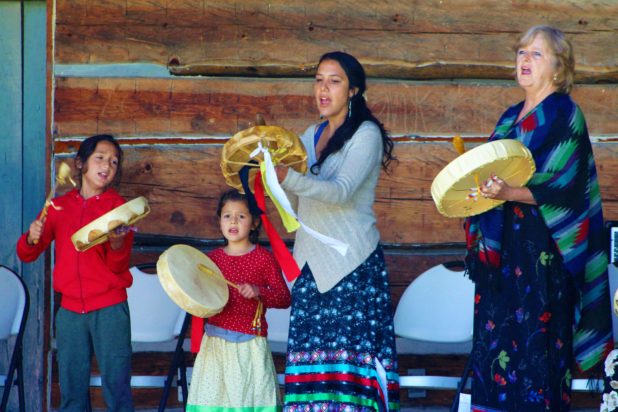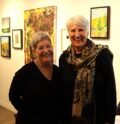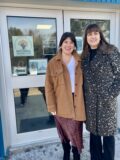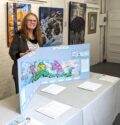Headline News
Bancroft celebrates Indigenous Day
June 27, 2018

Wenu and Chaska Pine perform with their mother Urpi and Karen Moore as part of the Shawashgun Ikwe singing group. / NATE SMELLE Staff
By Nate Smelle
A crowd of 40 people congregated in Millennium Park June 21 for Bancroft’s first ever Indigenous Day celebration. It was co-hosted by members of the Algonquin First Nation and the Town of Bancroft.
The event began with a smudging ceremony performed by Algonquin elder Ada Tinney. Bancroft’s Mayor Paul Jenkins welcomed the assembly, thanking them for coming out to celebrate this special occasion and reminding them of the several initiatives the town and the Algonquins have worked on together.
Following the mayor’s opening remarks, Chief Stephen Hunter acknowledged the many community members in the crowd that had pitched in to make the celebration possible. Hunter said they are looking forward to building on their relationship with the town and partnering on more projects in the future.
One of the fruits of this partnership, Hunter said, is an All-Nations Gathering being planned for Bancroft in 2019. The last All-Nations gathering to take place in Bancroft was held in the summer of 2013 in the field behind the North Hastings Community Centre. This time around, Hunter indicated that the gathering would be located along the York River in Bancroft’s Millennium Park and Riverside Park.
Addressing those in attendance and commenting on the significance of the Indigenous Day celebration, Hunter said, “Today is all about celebrating each other. We’re going to celebrate being Algonquins and we’re celebrating our responsibility to everyone here; and to the black flies, Blanding’s turtles, bats, bumblebees and everything else. We are all equal, we’re all valuable and we all have a responsibility to each other.”
Prior to the Shawashgun Ikwe singers’ performance, Hunter and Jenkins took a moment to raise the Algonquin flag in the place of the provincial flag.
Once the flag was waving, the singing group offered up an array of songs as prayers to the ancestors and the life-giving waters of the York River that flow through the Town of Bancroft.
Speaking with Shawashgun Ikwe singer Urpi Pine after the performance, she expressed how honoured she was to be a part of the group with her two children Wenu and Chaska. She has found the singing of traditional songs to be a fantastic way for her family to reconnect with their culture and remember their language.
Pine said she has been picking up pieces of Mi’kmaq language through singing with the Shawashgun Ikwe singers and from her mother who is in the process of relearning their language.
“Our community is coming together to reclaim the culture that is being taken and momentarily forgotten…and we are now remembering,” said Pine.
“I’m not Algonquin, I’m Mi’kmaq from out east, but I have the songs so I’m able to gift those songs back to the community, which is struggling to remember because it’s been so beaten down. We are just trying to remember who we are, and the songs really help us remember our language. At least the land can hear those voices and the ancestors that are still here can understand those prayers that we are offering.”
Imagining 50 years from now, Pine said she could picture her children’s children fully embracing their culture, growing up in it and passing it on to their kids. Though Mi’kmaq people may have stronger language than a lot of other nations, she said they have forgotten many of their ceremonies and other aspects of their culture. Fortunately, they have been working with other First Nations to mutually rebuild their cultures.
“We’ve been really Christianized, but we’ve also been gifted by the Anishinabek people back some of the ceremonies that we’ve lost – sweat lodges, Sun Dance,” she explained.
“There is a cultural exchange happening right now where some nations remember one thing and some nations remember another thing, so we are all trying to piece it together after residential schools, after hundreds of years of colonization.”
Pine believes that healing the trauma Indigenous people have endured for centuries in Canada since colonization needs to begin early in a child’s life. To begin the healing process in her own family, she said she would sing some of the songs/prayers to her children while she was carrying them in her womb.
“I think that the idea of passing down trauma is a good one to understand how we have struggled as a people, but it can almost be suffocating at times,” said Pine.
“It’s important to remember that we can also heal that in the womb; and that it’s not something that we have to keep passing down. We need to remember what has happened, so it never happens again – although it seems to be happening over and over again. It’s still happening at the border, it’s still happening with most of the kids in foster care. There are actually more Indigenous kids in foster care now than at the height of the residential schools.”
Algonquin elder Katherine Cannon was another of the singers and drummers performing with Shawashgun Ikwe on Indigenous Day in Bancroft. Reminiscing on some of the ways her mother would pass down teachings to her as a child, she commented on how wonderful it was that Pine’s children were getting an early start learning about and practicing their Indigenous culture.
Cannon remembers how her mother played an instrumental role in teaching her about Algonquin culture and values, despite the fact it was frowned upon by many non-native members of the community at the time.
“Now is the time to get them started,” said Cannon.
“When we were their age, we weren’t allowed to let anyone know that we were Algonquin, let alone practice our culture. But, my mom used to take us out in the field and teach us things about the medicines. We would all go berry picking together and she would talk to us about our culture. So, we did learn quite a bit, but we weren’t really allowed to let people know it.”

















